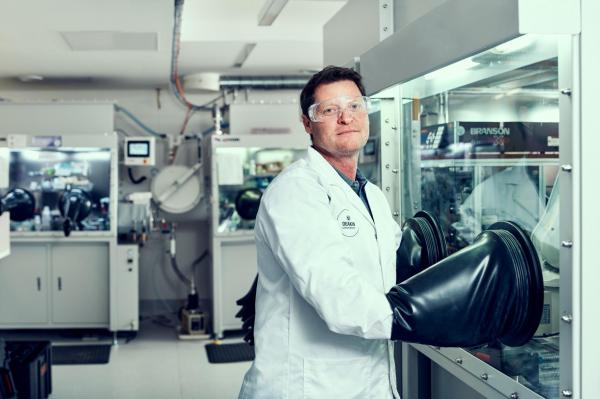A 50-strong team at GMC Major Sponsor Deakin University’s BatTRI-Hub is playing a vital role in developing Australia’s advanced battery technology, with a new state-of-the-art cell making facility due in to open May, and research and innovation projects already underway.
The Victorian state government has granted $5.2 million to support the creation of the Battery Technology Research and Innovation Hub 2.0 – known as BatTRI-HUB 2.0 – a dedicated, world-class facility for advanced battery design, fabrication and testing.
The battery market is exponentially growing to keep up with developments in telecommunications, computing, electric bikes and scooters, energy storage for our homes and the grid, drones and a multitude of other gadgets.
“All these applications require batteries, which need to be sustainable,” Deakin University Professor Maria Forsyth tells Geelong Manufacturing Council. “
“Our facility is a flexible, prototyping pilot-scale facility which can really deliver on advanced batteries beyond lithium, and that is what will allow the next generation of batteries to be manufactured.”
The battery industry, which currently adds $1.3 billion value and 6,000 jobs to Australia’s economy, is estimated to have potential to grow to $7.4 billion annually by 2030 and more than 34, 000 jobs.
The new BatTRI-HUB 2.0 facility includes a pilot production line to manufacture advanced batteries and components, an expansion of existing pouch cell prototyping, a cell and pack testing lab, and cell diagnostics and materials characterisation.
The unique, world-class research and innovation centre will seek to advance existing technologies such as lithium (the type of batteries used in electric vehicles and home energy storage systems) but is also focusing on sustainable alternatives, such as sodium batteries.
“The idea is really to build cell manufacturing capability here in the region,” Professor Forsyth says. “We haven’t yet got the capability in Victoria to make large battery cells and BatTRI-HUB 2.0 will allow us to build these larger units. As the last couple of years have shown us, it’s really important that Australia has a strong manufacturing capability – in batteries as in other areas.”
The team is eager to move beyond research and address problems associated with upscaling in order to manufacture in quantity.
“The next thing is to upscale the pouch cells we have produced to make a pack which we can then test in a scooter, or something similar, the idea being to test our experimental results in real world applications,” she says. “We take our science from the lab all the way through to translation into life size batteries. That is pretty unique, that capability of being able to work across the whole chain.”
BatTRI-Hub 2.0 will provide industry around the world with “a place they can go for testing materials, and ideas of new cell configurations with new materials.”
In a collaboration with technology company Calix, which has a reactor at Bacchus Marsh to produce battery electrode materials, UK manufacturer AMTE Power is making a new scooter pack using materials perfected by Professor Forsyth and her team.
“It will be cobalt free so it is a much more sustainable option than the existing lithium-ion batteries that we currently have in our phones and in most applications,” she says.
Until now, most of Australia’s minerals used in battery production have been exported as raw materials, with the high-value-added benefits lost to the economy.
The breakthrough technology will promote manufacture in Australia.
“We have everything we need in Australia – we have lithium, we have the other elements required in a battery, like manganese and cobalt and nickel, the research skills, and the innovation – but we do not have a battery manufacturing capability yet.
“This investment will really underpin battery manufacturing capability in Victoria – from using the minerals here instead of shipping them overseas, through to making the battery cells and having industry take that knowledge to create a giga factory or two here in Australia, hopefully even in Geelong” says Professor Forsyth.

Images supplied

